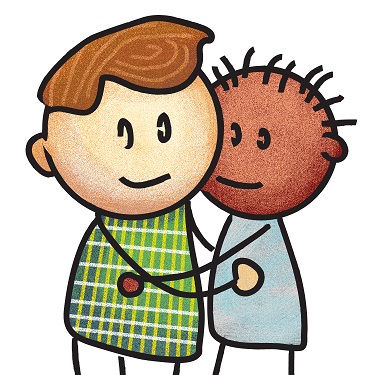 By Nadine Briggs and Donna Shea
By Nadine Briggs and Donna Shea
When you are working with the school system to create an education plan for your child, it is important to remember to consider the social-emotional aspects of your child’s life at school. It may even be the case that your child does well academically, but has an education plan just for social-emotional support. Does your team feel that your child is able to access that aspect of school life? Is your child feeling successful at recess and as though he or she has friends at school? If not, a social goal (or more than one) should be included in your child’s plan to give him or her support in making social connections. Here are few of the main areas to consider:
Proximity –Does your child try to talk to peers from across the room? Does he or she try to talk to kids when he or she hasn’t gotten their attention first? Your child may need support and guidance regarding how close to get to other kids. He or she might need practice and direct instruction on how to gain another child’s attention. An adult can help your child learn how to read social cues, such as when there is a break in the conversation or activity so he or she learns how to pick his or her moment to interject his or her thought. Kids who struggle with these types of social encounters will awkwardly try to interact with other kids, and then when it doesn’t go well, he or she will take it as a personal failure or become angry with the other child for not wanting to play.
Joining in – Does your child know how to join a group and know that when he or she does join the group, how to interact? To join in, he or she should say, “I’d like to play with you” instead of “Can I play with you?” Stating the desire, rather than asking a yes-or-no question increases your child’s chance of being included. Once your child joins the group, he or she should be coached to then say, “Tell me what you are playing” and then conform to that the group is doing. He or she needs to be discouraged from changing the game, complicating the rules or trying to wrest control of the interaction to meet his or her own needs.
Emotions – Is your child hindered socially by not being able to control strong emotions? The first step is to helps your child understand and label the emotion. Then he or she can begin to recognize what that emotion feels like when it arises and employ a strategy to tame the strong feeling before it grows out of control.
Conversation – Does your child talk about things that interest him or her without considering whether or not the other person is also interested? Teaching your child to ask about other people first is a way of learning to start a conversation, helps him or her with conversation skills and also allows your child to work on learning perspective taking.
Beyond the skills your child needs to manage in the classroom, it is important to also think about any supports he or she might need during unstructured times of the school day. A plan for recess that might include a recess club led by an adult to target these social goals has helped many kids. It can also help to provide a child seating at lunch with kids who are of an accepting nature.
These are just a few ideas to help your child access the fun and sociable parts of the school day. And all of these things can be written into a plan with measurable goals.

